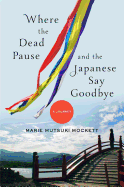
In Where the Dead Pause, and the Japanese Say Goodbye, Marie Mutsuki Mockett (Picking Bones from Ash) offers an intensely personal and moving reflection of grief, mourning and the role that Buddhism plays in resolving those feelings amid catastrophe. The title alludes to a belief that souls pause at one final physical location, such as the long-dormant volcano Mount Osore, before passing into the afterlife. Mockett, whose maternal family owns a Zen Buddhist temple on the tsunami-devastated Tohoku coast of Northeastern Japan, returns to bury her grandparents' bones.
Mockett reflects on her personal losses (the passing of her father three years earlier and the recent death of her grandfather) and undertakes a pilgrimage to Shinto, Zen and Shingon Buddhist temples to meditate on her family deaths in the context of the tsunami, finding comfort and understanding in the rituals of owakare ("the great parting"), omukae ("the great receiving," when the dead revisit) and okuribi ("the great sending off," when the dead return to the afterlife). She visits a river known as Sai no Kawara, where dead children's souls go to do penance. In reconciling the divergent beliefs and traditions between Buddhism and Shintoism and between Buddhism and the West, she recognizes that grief, and its subsequent resolution, is a shared experience that crosses cultural and religious boundaries. "Grief is not a one-way street... for the dead miss us as much as miss them." Mockett's memoir speaks to the heart and is a moving testament to what human spirits can endure. --Nancy Powell, freelance writer and technical consultant

